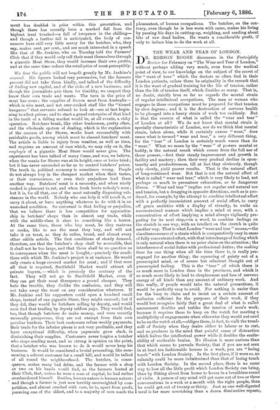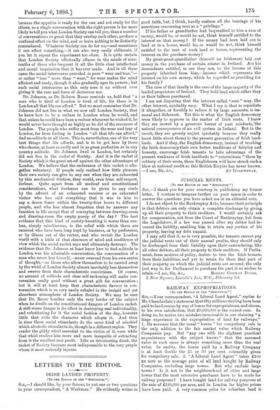THE WEAR AND TEAR OF LONDON.
DR. ROBSON ROOSE discourses in the Fortnightly Review for February on "The Wear and Tear of London," without perhaps adding very much, even from the medical point of view, to our knowledge on the subject of the secret of the "want of tone" which the doctors so often find in their London patients, unless there be originality in the remark that it is the want of gradual training for the life of tension., rather than the life of tension itself, which disables so many. That is, no doubt, strictly true so far as regards the mental strain of regular intellectual occupations. The man or woman who engages in these occupations must be prepared for that tension by slow degrees ; and it is the destruction of nervous health to be plunged into a heavy strain of work too suddenly. But is that the essence of what is called the "wear and tear" of London at all ? We do not know that mental strain is specially characteristic of London, nor do we think that mental strain, taken alone, while it certainly causes "wear," does cause what is termed "wear and tear," a very different thing, for the " tear " of London is certainly much worse than its "wear." What we mean by the " wear " of powers mental or bodily, is the natural result which comes from the full use of those powers,—first their steady improvement and growth in facility and mastery ; then their very gradual decline in spon- taneity and productiveness, till at last they obviously, though only slowly, yield poorer results. That is the natural effect of long-continued wear. But that is not the natural effect of what is called "wear and tear," which is very likely to lead, not perhaps so much to premature exhaustion, as to dangerous illness. "Wear and tear" implies not regular and natural use and tension, but a dragging in opposite directions, such as is pro- duced, for example, by the attempt to combine intellectual effort with a perfectly inconsistent amount of social effort, to carry off grave anxieties with a display of vivacity, to unite an unconstrained manner which implies a mind at ease, with a concentration of effort implying a mind always vigilantly pre- paring for its next step,—in a word, to combine feelings on the stretch in one way, with an intellect on the stretch in quite another way. That is what London "wear and tear " means,—the simultaneousness of a strain which is comparatively easy in cases of fully concentrated effort, with that interchange of feeling which is only natural when there is no mior claim on the attention ; the interference of social duties with professional duties ; the making time for one thing when all the time there is, is really pre- engaged for another thing; the squeezing of gaiety out of a preoccupied mind, or of severe but reluctant thought out of preoccupied feeling. This is the " tear " of which there is so much more in London than in the provinces, and which is so much more likely to lead to sleeplessness and loss of nervous energy of all kinds than any amount of ordinary work. And this really, if people would take the natural precautions, it would be perfectly easy to avoid. For nothing is easier than for the busy to claim and to insist on a certain amount of seclusion sufficient for the purposes of their work, if they would but recognise fairly that a great deal of what is called amusement doubles and trebles the tension of men's work, because it requires them to keep on the watch for meeting a multiplicity of engagements when otherwise they would not need to boon the watch at all,—obliges them, in fact, to walk the tread- mill of Society when they desire either to labour or to rest, and so produces in the mind that painful sense of distraction which halves the intellectual power while it doubles the excite- ability of exciteable brains. No illusion is more curious than that which seems to pervade Society, that if you are not seen in at least ten fashionable houses in a week, you are "losing touch "with London Society. In the first place, if it were so, no calamity could be more infinitesimal than that of losing touch with London Society. In the second place, there is no surer way to lose all the little profit which London Society can bring, than by flitting about from house to house in a breathless round of visits. A person of any mind will get more out of two or three conversations in a week or a month with the right people, than he could get out of twenty or thirty. Just as one well-digested meal is far more nourishing than a dozen diminutive repasts,
because the appetite is ready for the one and not ready for the others, so a single conversation with the right person is far more likely to tell you what London Society can tell you, than a number of conversations so great that they overlap each other, produce a confused effect on the mind, and so leave nothing to be distinctly remembered. Whatever Society can do for us,—and sometimes it can effect something,—it can also very easily obliterate, if you let it repeat the experiment too often. It is quite certain that London Society effectually effaces in the minds of nine- tenths of those who frequent it all the little clear intellectual and moral impression that it has ever made. And in all these cases the social intercourse provided is pure "wear and tear,"— or rather " tear " more than "wear," for Wear makes the mind efficient and ready, though it also gradually ages its powers ; but such social intercourse as this only uses it up without ever giving it the ease and force of dexterous use.
Dr. Johnson, as Dr. Robson Roose reminds us, held that "a man who is tired of London is tired of life, for there is in London all that life can afford." But we must remember that Dr. Johnson did not live in what we now call London Society, that he knew how to be a recluse in London when he would, and that unless he could have been a recluse whenever he wished it, he would never have thought so highly as be did of the resources of London. The people who suffer most from the wear and tear of London, far from finding in London "all that life can afford," find no solitude at all there. This is, nevertheless, one of the very beat things that life affords, and is to be got here by those who choose, at least as easily and in as great perfection as in any country solitude. Dr. Johnson lived in London, but certainly did not live in the racket of Society. And it is the racket of Society which is the great set-off against the other advantages of London. We believe that the endurance of this racket is alto- gether voluntary. If people only realised how little pleasure their own society can give to any one when they are exhausted by this mechanical friction, they would, even from self-respect, forbear. Quite apart from all medical and constitutional considerations, what freshness can be given to any circle by the advent of an exhausted receiver or an exhausted visitor who has said everything that it was in him to say a dozen times within the twenty-four hours to different people, and who has almost forgotten that he answers any function in life except that of conveying between drawing-room and drawing-room the empty gossip of the day ? The best evidence that this kind of society-haunting is worse than use- less, simply mischievous, is the relief with which those are received who have been long kept by business, or by preference, or by illness out of the vortex, and who revisit the London world with a little of that clearness of mind and confidence of view which the social racket saps and ultimately destroys. The evidence that Dr. Johnson at least knew how to find solitude in London was his admirable conversation, the conversation of a man who never lost himself,—never swerved from his own centre of thoughts—as those who allow themselves to be carried away by the whirl of London Society almost inevitably lose themselves and swerve from their characteristic convictions. Of course, no amount of solitude and clear self-reckoning will make con- versation really good without a great gift for conversation ; but it will at least keep that characteristic flavour in con- versation which is so very easily exhaled in the insipid and yet absorbent atmosphere of London Society. We may be sure that Dr. Roose touches only the very border of the subject when he dwells on the constitutional dangers of London racket. A still worse danger is its effect in destroying real individuality, and substituting for it the social fashion of the day, however little that suits the character which adopts it. And then in time these social stimulants do the same kind of mischief which alcoholic stimulants do, though in a different region. They render the giddy whirl essential to the victim of it, even while that whirl renders him more and more incapable of extracting from it the smallest real profit. Like an intoxicating drink, the racket of Society becomes most indispensable to the very people whom it most seriously injures.















































 Previous page
Previous page